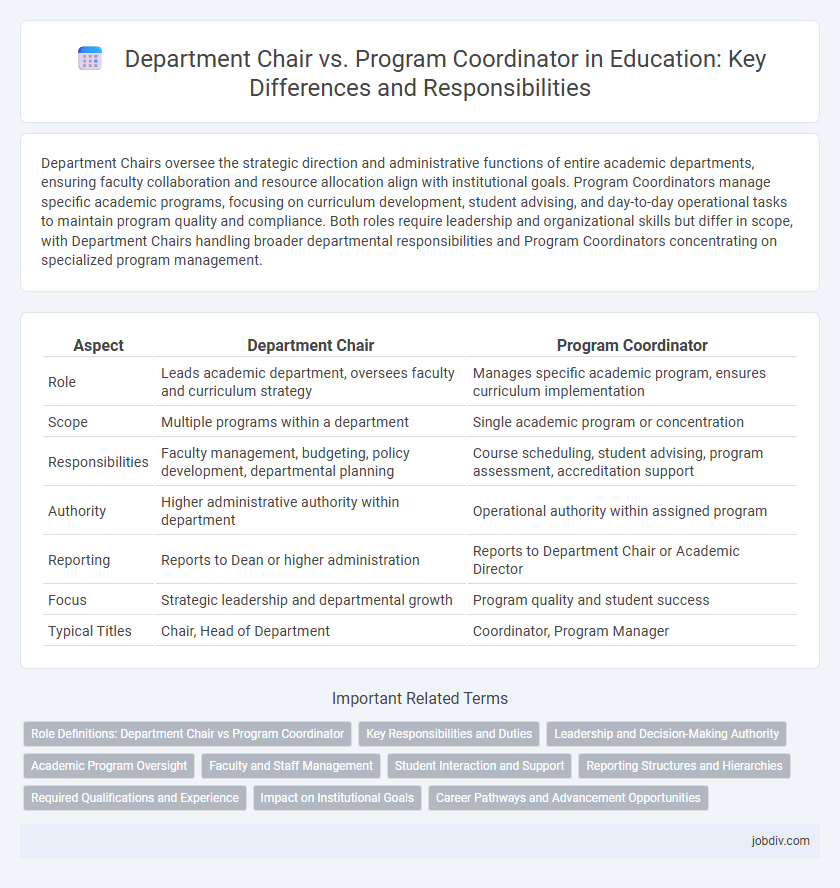Department Chairs oversee the strategic direction and administrative functions of entire academic departments, ensuring faculty collaboration and resource allocation align with institutional goals. Program Coordinators manage specific academic programs, focusing on curriculum development, student advising, and day-to-day operational tasks to maintain program quality and compliance. Both roles require leadership and organizational skills but differ in scope, with Department Chairs handling broader departmental responsibilities and Program Coordinators concentrating on specialized program management.
Table of Comparison
| Aspect | Department Chair | Program Coordinator |
|---|---|---|
| Role | Leads academic department, oversees faculty and curriculum strategy | Manages specific academic program, ensures curriculum implementation |
| Scope | Multiple programs within a department | Single academic program or concentration |
| Responsibilities | Faculty management, budgeting, policy development, departmental planning | Course scheduling, student advising, program assessment, accreditation support |
| Authority | Higher administrative authority within department | Operational authority within assigned program |
| Reporting | Reports to Dean or higher administration | Reports to Department Chair or Academic Director |
| Focus | Strategic leadership and departmental growth | Program quality and student success |
| Typical Titles | Chair, Head of Department | Coordinator, Program Manager |
Role Definitions: Department Chair vs Program Coordinator
The Department Chair oversees the strategic direction, faculty management, and resource allocation within an academic department, ensuring alignment with institutional goals. The Program Coordinator manages the day-to-day operations of specific academic programs, including curriculum scheduling, student advising, and compliance with accreditation standards. Both roles are critical in higher education administration, with the Department Chair focusing on leadership and departmental governance, while the Program Coordinator emphasizes program implementation and student support.
Key Responsibilities and Duties
Department Chairs oversee academic departments, managing faculty recruitment, curriculum development, and budgeting to ensure alignment with institutional goals. Program Coordinators handle the day-to-day administration of specific academic programs, including scheduling courses, advising students, and coordinating program assessments. Both roles are essential for maintaining educational quality, with Department Chairs focusing on strategic leadership and Program Coordinators emphasizing operational efficiency.
Leadership and Decision-Making Authority
Department Chairs hold higher leadership roles with broad decision-making authority over academic policies, faculty management, and resource allocation within a department. Program Coordinators focus on specific program implementation, curriculum oversight, and student support, with limited authority mostly confined to operational decisions. The Department Chair's leadership impacts strategic direction, while Program Coordinators ensure effective program execution and compliance with departmental goals.
Academic Program Oversight
Department Chairs hold primary responsibility for overall academic program oversight, including curriculum development, faculty management, and resource allocation within a specific department. Program Coordinators focus on the day-to-day administration of academic programs, ensuring course scheduling, student advising, and compliance with accreditation standards. Effective academic program oversight requires collaboration between Department Chairs and Program Coordinators to align strategic goals with operational execution.
Faculty and Staff Management
Department Chairs oversee multiple faculty members and staff within an academic department, ensuring alignment with institutional goals and managing faculty appointments, evaluations, and resource allocation. Program Coordinators focus on specific academic programs, facilitating curriculum development, student advising, and collaboration among faculty within their program. Both roles require leadership skills, but Department Chairs have broader administrative authority and responsibility for overall departmental performance.
Student Interaction and Support
Department Chairs oversee academic policies and faculty coordination, enabling broad student support through curriculum development and resource allocation. Program Coordinators maintain direct, daily interaction with students by managing schedules, addressing individual concerns, and facilitating communication between students and faculty. Both roles contribute uniquely to student success, with Chairs focusing on strategic leadership and Coordinators emphasizing personal engagement and operational support.
Reporting Structures and Hierarchies
Department Chairs typically report directly to the Dean or higher academic administration, overseeing multiple programs within a department and managing faculty members. Program Coordinators usually report to Department Chairs or Program Directors, focusing on the administration and day-to-day operations of a specific academic program. The hierarchical structure places Department Chairs at a higher level of authority and broader responsibility compared to Program Coordinators.
Required Qualifications and Experience
Department Chairs typically require a doctoral degree in their discipline and extensive faculty experience, often including prior administrative roles. Program Coordinators generally need at least a master's degree and practical experience in program management or curriculum development. Both positions benefit from strong leadership skills, but Department Chairs usually demand a higher level of academic achievement and strategic oversight capabilities.
Impact on Institutional Goals
Department Chairs often influence institutional goals by shaping curriculum standards, faculty development, and resource allocation, driving overall academic quality and alignment with the university's mission. Program Coordinators focus on specific academic programs, ensuring compliance with accreditation standards, enhancing student outcomes, and supporting program-specific objectives that contribute directly to institutional performance metrics. Both roles play complementary parts in advancing educational excellence and strategic priorities within higher education institutions.
Career Pathways and Advancement Opportunities
Department Chairs typically oversee academic departments, managing faculty, budgets, and curricula, and often have more strategic influence, positioning them for advancement into senior administrative roles such as Dean or Director of Academic Affairs. Program Coordinators focus on specific academic or training programs, handling scheduling, student support, and compliance, which hones skills suitable for roles in student services or specialized academic management. Career pathways for Department Chairs often lead to higher-level leadership positions within educational institutions, while Program Coordinators may advance into expanded program management or cross-departmental coordination roles.
Department Chair vs Program Coordinator Infographic

 jobdiv.com
jobdiv.com